War's Toll: A Comparative Analysis of Owen and Douglas' English Poetry
VerifiedAdded on 2023/04/07
|14
|3284
|452
Essay
AI Summary
This essay provides a comparative analysis of the war poetry of Wilfred Owen and Keith Douglas, focusing on their differing experiences and perspectives shaped by World War I and World War II, respectively. The essay delves into the poets' deployment of language, examining their use of tone, diction, and imagery to convey the realities of the battlefield and the emotional toll of war. It explores the poets' use of stanza forms and rhyming schemes, highlighting how these techniques contribute to the overall meaning and impact of their poems. The essay further discusses the historical context of their works, contrasting Owen's experiences in the trenches with Douglas's wartime service and examining how these experiences influenced their writing styles and beliefs. Through a close reading of poems such as 'Futility' and 'Vergissmeinnicht,' the analysis reveals how both poets grapple with themes of death, loss, and the dehumanizing effects of conflict, offering insights into their contrasting views on war and its impact on individuals and society. The essay concludes by summarizing the lasting impact of their poetry and their contributions to the genre of war literature.
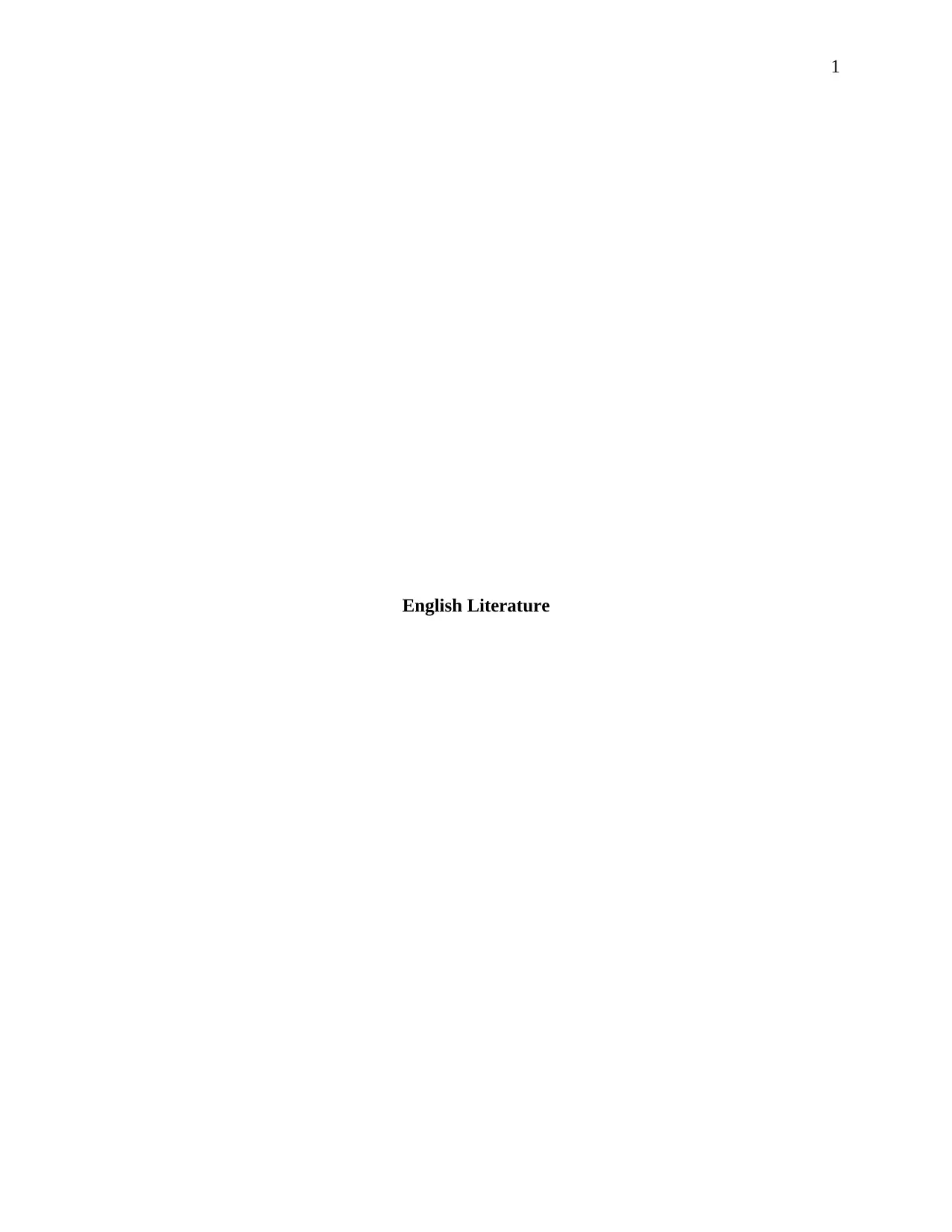
1
English Literature
English Literature
Paraphrase This Document
Need a fresh take? Get an instant paraphrase of this document with our AI Paraphraser
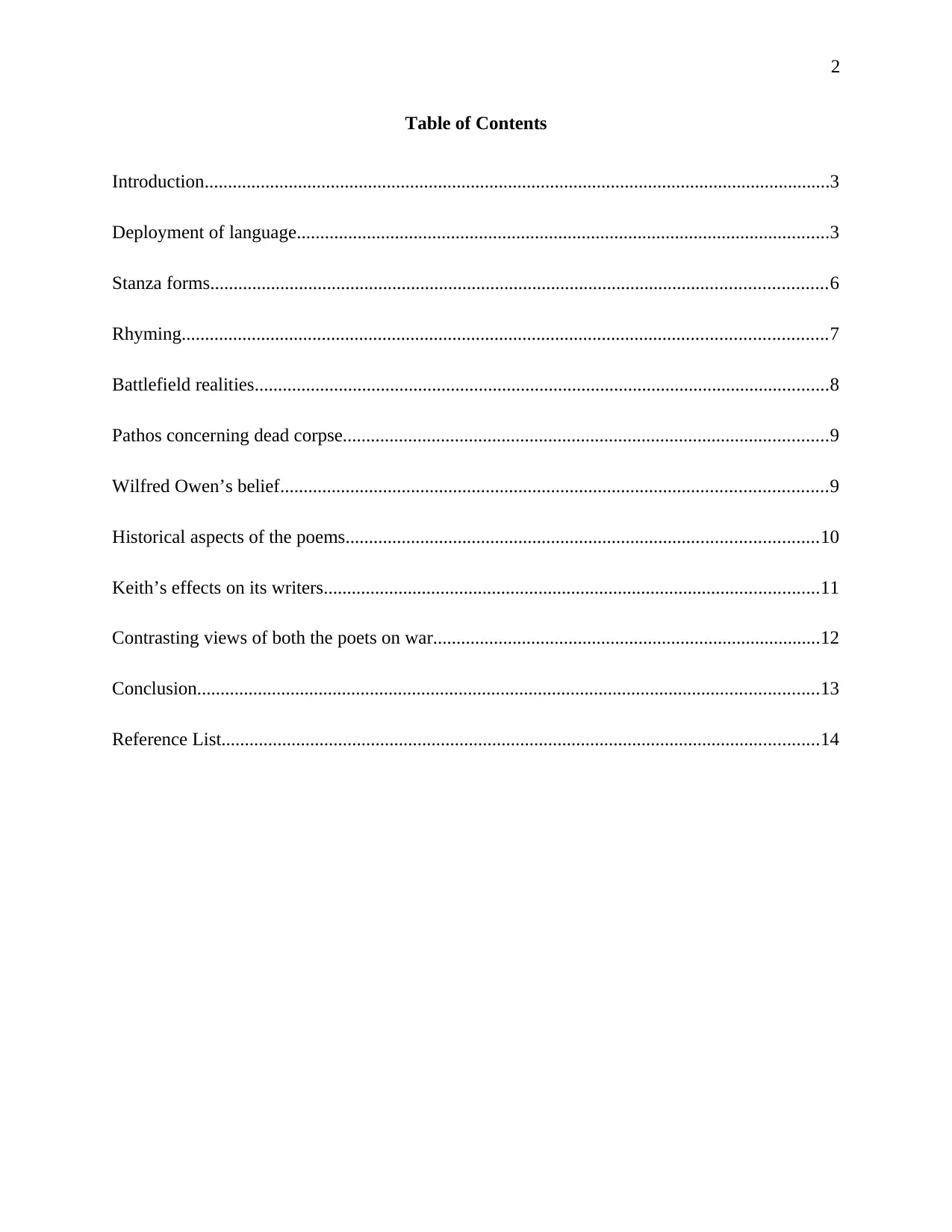
2
Table of Contents
Introduction......................................................................................................................................3
Deployment of language..................................................................................................................3
Stanza forms....................................................................................................................................6
Rhyming..........................................................................................................................................7
Battlefield realities...........................................................................................................................8
Pathos concerning dead corpse........................................................................................................9
Wilfred Owen’s belief.....................................................................................................................9
Historical aspects of the poems.....................................................................................................10
Keith’s effects on its writers..........................................................................................................11
Contrasting views of both the poets on war...................................................................................12
Conclusion.....................................................................................................................................13
Reference List................................................................................................................................14
Table of Contents
Introduction......................................................................................................................................3
Deployment of language..................................................................................................................3
Stanza forms....................................................................................................................................6
Rhyming..........................................................................................................................................7
Battlefield realities...........................................................................................................................8
Pathos concerning dead corpse........................................................................................................9
Wilfred Owen’s belief.....................................................................................................................9
Historical aspects of the poems.....................................................................................................10
Keith’s effects on its writers..........................................................................................................11
Contrasting views of both the poets on war...................................................................................12
Conclusion.....................................................................................................................................13
Reference List................................................................................................................................14
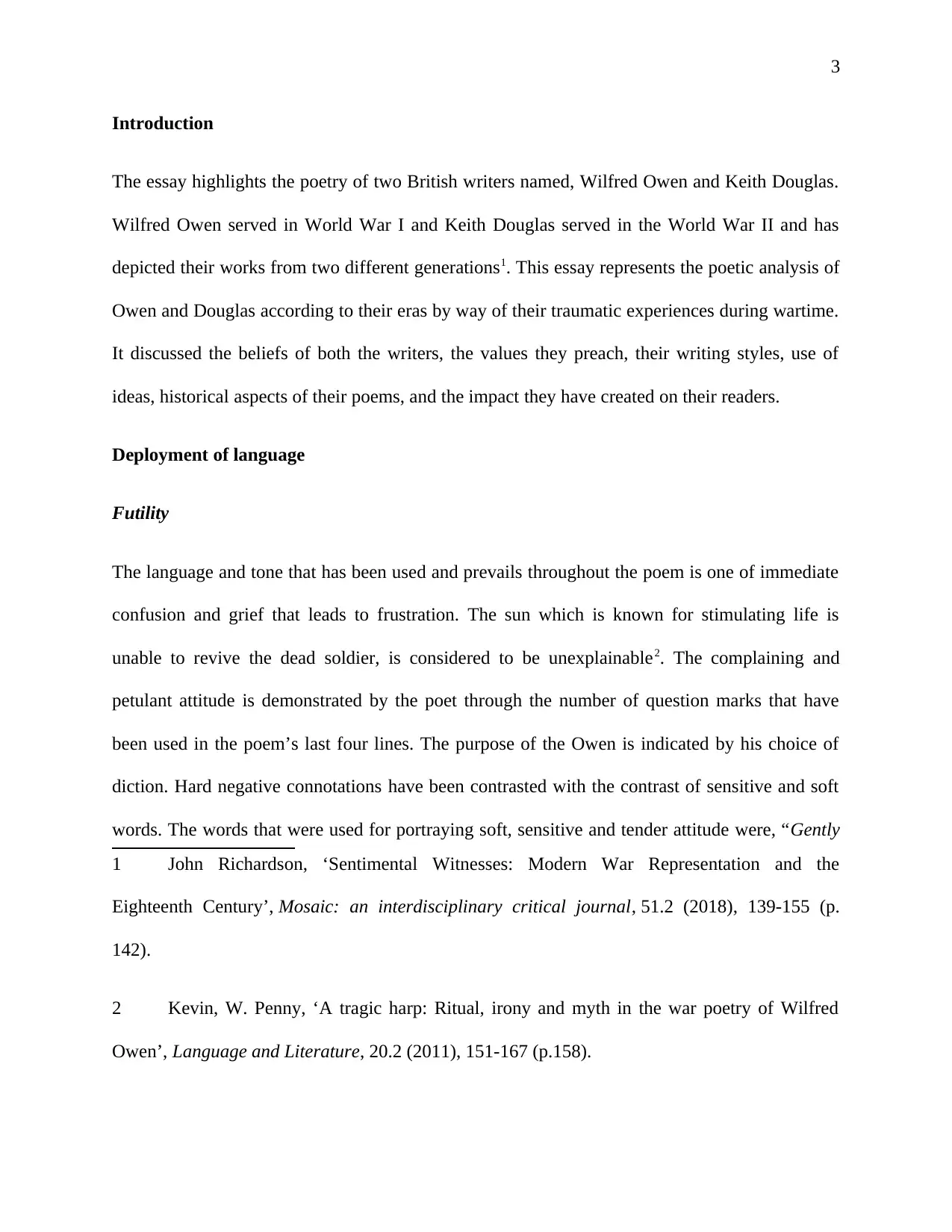
3
Introduction
The essay highlights the poetry of two British writers named, Wilfred Owen and Keith Douglas.
Wilfred Owen served in World War I and Keith Douglas served in the World War II and has
depicted their works from two different generations1. This essay represents the poetic analysis of
Owen and Douglas according to their eras by way of their traumatic experiences during wartime.
It discussed the beliefs of both the writers, the values they preach, their writing styles, use of
ideas, historical aspects of their poems, and the impact they have created on their readers.
Deployment of language
Futility
The language and tone that has been used and prevails throughout the poem is one of immediate
confusion and grief that leads to frustration. The sun which is known for stimulating life is
unable to revive the dead soldier, is considered to be unexplainable2. The complaining and
petulant attitude is demonstrated by the poet through the number of question marks that have
been used in the poem’s last four lines. The purpose of the Owen is indicated by his choice of
diction. Hard negative connotations have been contrasted with the contrast of sensitive and soft
words. The words that were used for portraying soft, sensitive and tender attitude were, “Gently
1 John Richardson, ‘Sentimental Witnesses: Modern War Representation and the
Eighteenth Century’, Mosaic: an interdisciplinary critical journal, 51.2 (2018), 139-155 (p.
142).
2 Kevin, W. Penny, ‘A tragic harp: Ritual, irony and myth in the war poetry of Wilfred
Owen’, Language and Literature, 20.2 (2011), 151-167 (p.158).
Introduction
The essay highlights the poetry of two British writers named, Wilfred Owen and Keith Douglas.
Wilfred Owen served in World War I and Keith Douglas served in the World War II and has
depicted their works from two different generations1. This essay represents the poetic analysis of
Owen and Douglas according to their eras by way of their traumatic experiences during wartime.
It discussed the beliefs of both the writers, the values they preach, their writing styles, use of
ideas, historical aspects of their poems, and the impact they have created on their readers.
Deployment of language
Futility
The language and tone that has been used and prevails throughout the poem is one of immediate
confusion and grief that leads to frustration. The sun which is known for stimulating life is
unable to revive the dead soldier, is considered to be unexplainable2. The complaining and
petulant attitude is demonstrated by the poet through the number of question marks that have
been used in the poem’s last four lines. The purpose of the Owen is indicated by his choice of
diction. Hard negative connotations have been contrasted with the contrast of sensitive and soft
words. The words that were used for portraying soft, sensitive and tender attitude were, “Gently
1 John Richardson, ‘Sentimental Witnesses: Modern War Representation and the
Eighteenth Century’, Mosaic: an interdisciplinary critical journal, 51.2 (2018), 139-155 (p.
142).
2 Kevin, W. Penny, ‘A tragic harp: Ritual, irony and myth in the war poetry of Wilfred
Owen’, Language and Literature, 20.2 (2011), 151-167 (p.158).
⊘ This is a preview!⊘
Do you want full access?
Subscribe today to unlock all pages.

Trusted by 1+ million students worldwide
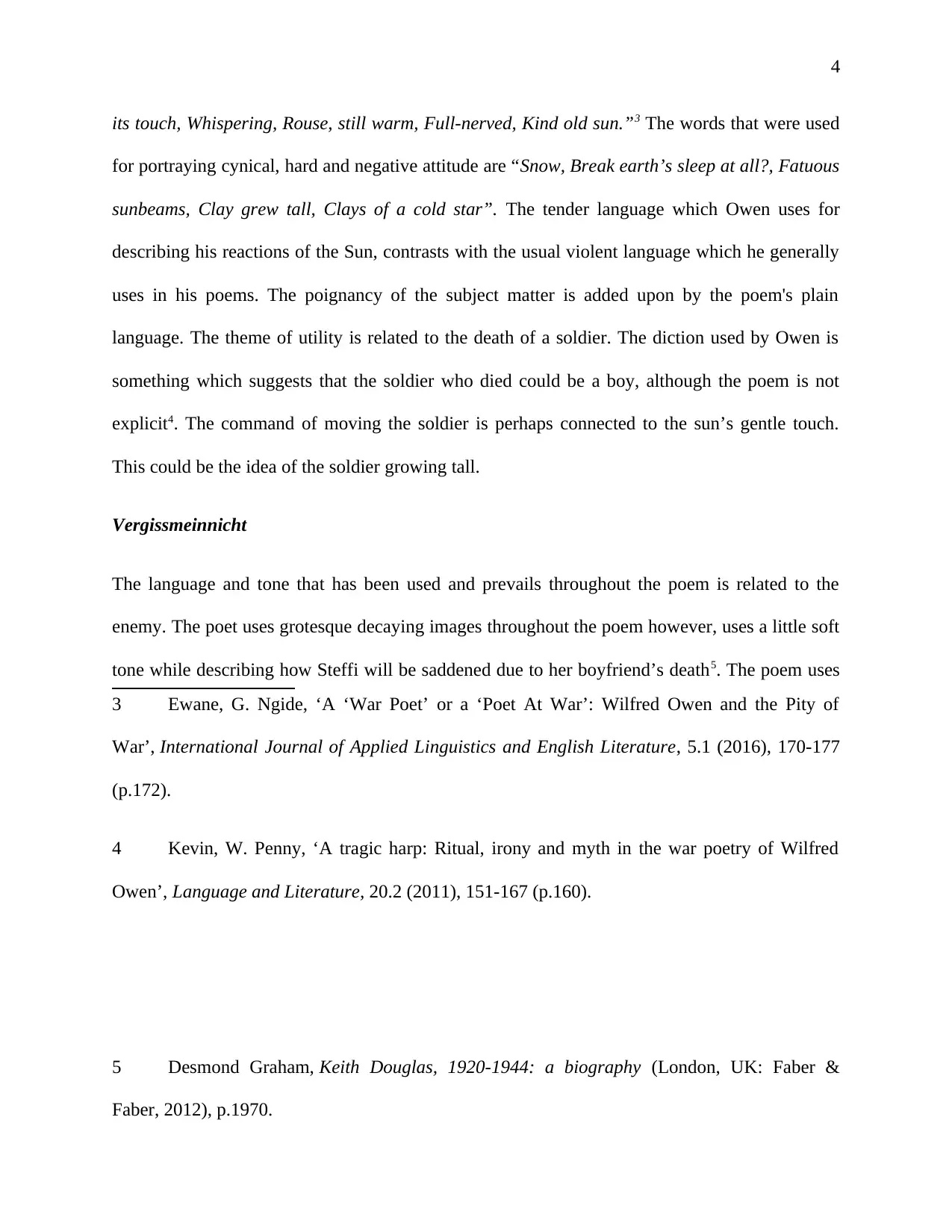
4
its touch, Whispering, Rouse, still warm, Full-nerved, Kind old sun.”3 The words that were used
for portraying cynical, hard and negative attitude are “Snow, Break earth’s sleep at all?, Fatuous
sunbeams, Clay grew tall, Clays of a cold star”. The tender language which Owen uses for
describing his reactions of the Sun, contrasts with the usual violent language which he generally
uses in his poems. The poignancy of the subject matter is added upon by the poem's plain
language. The theme of utility is related to the death of a soldier. The diction used by Owen is
something which suggests that the soldier who died could be a boy, although the poem is not
explicit4. The command of moving the soldier is perhaps connected to the sun’s gentle touch.
This could be the idea of the soldier growing tall.
Vergissmeinnicht
The language and tone that has been used and prevails throughout the poem is related to the
enemy. The poet uses grotesque decaying images throughout the poem however, uses a little soft
tone while describing how Steffi will be saddened due to her boyfriend’s death5. The poem uses
3 Ewane, G. Ngide, ‘A ‘War Poet’ or a ‘Poet At War’: Wilfred Owen and the Pity of
War’, International Journal of Applied Linguistics and English Literature, 5.1 (2016), 170-177
(p.172).
4 Kevin, W. Penny, ‘A tragic harp: Ritual, irony and myth in the war poetry of Wilfred
Owen’, Language and Literature, 20.2 (2011), 151-167 (p.160).
5 Desmond Graham, Keith Douglas, 1920-1944: a biography (London, UK: Faber &
Faber, 2012), p.1970.
its touch, Whispering, Rouse, still warm, Full-nerved, Kind old sun.”3 The words that were used
for portraying cynical, hard and negative attitude are “Snow, Break earth’s sleep at all?, Fatuous
sunbeams, Clay grew tall, Clays of a cold star”. The tender language which Owen uses for
describing his reactions of the Sun, contrasts with the usual violent language which he generally
uses in his poems. The poignancy of the subject matter is added upon by the poem's plain
language. The theme of utility is related to the death of a soldier. The diction used by Owen is
something which suggests that the soldier who died could be a boy, although the poem is not
explicit4. The command of moving the soldier is perhaps connected to the sun’s gentle touch.
This could be the idea of the soldier growing tall.
Vergissmeinnicht
The language and tone that has been used and prevails throughout the poem is related to the
enemy. The poet uses grotesque decaying images throughout the poem however, uses a little soft
tone while describing how Steffi will be saddened due to her boyfriend’s death5. The poem uses
3 Ewane, G. Ngide, ‘A ‘War Poet’ or a ‘Poet At War’: Wilfred Owen and the Pity of
War’, International Journal of Applied Linguistics and English Literature, 5.1 (2016), 170-177
(p.172).
4 Kevin, W. Penny, ‘A tragic harp: Ritual, irony and myth in the war poetry of Wilfred
Owen’, Language and Literature, 20.2 (2011), 151-167 (p.160).
5 Desmond Graham, Keith Douglas, 1920-1944: a biography (London, UK: Faber &
Faber, 2012), p.1970.
Paraphrase This Document
Need a fresh take? Get an instant paraphrase of this document with our AI Paraphraser
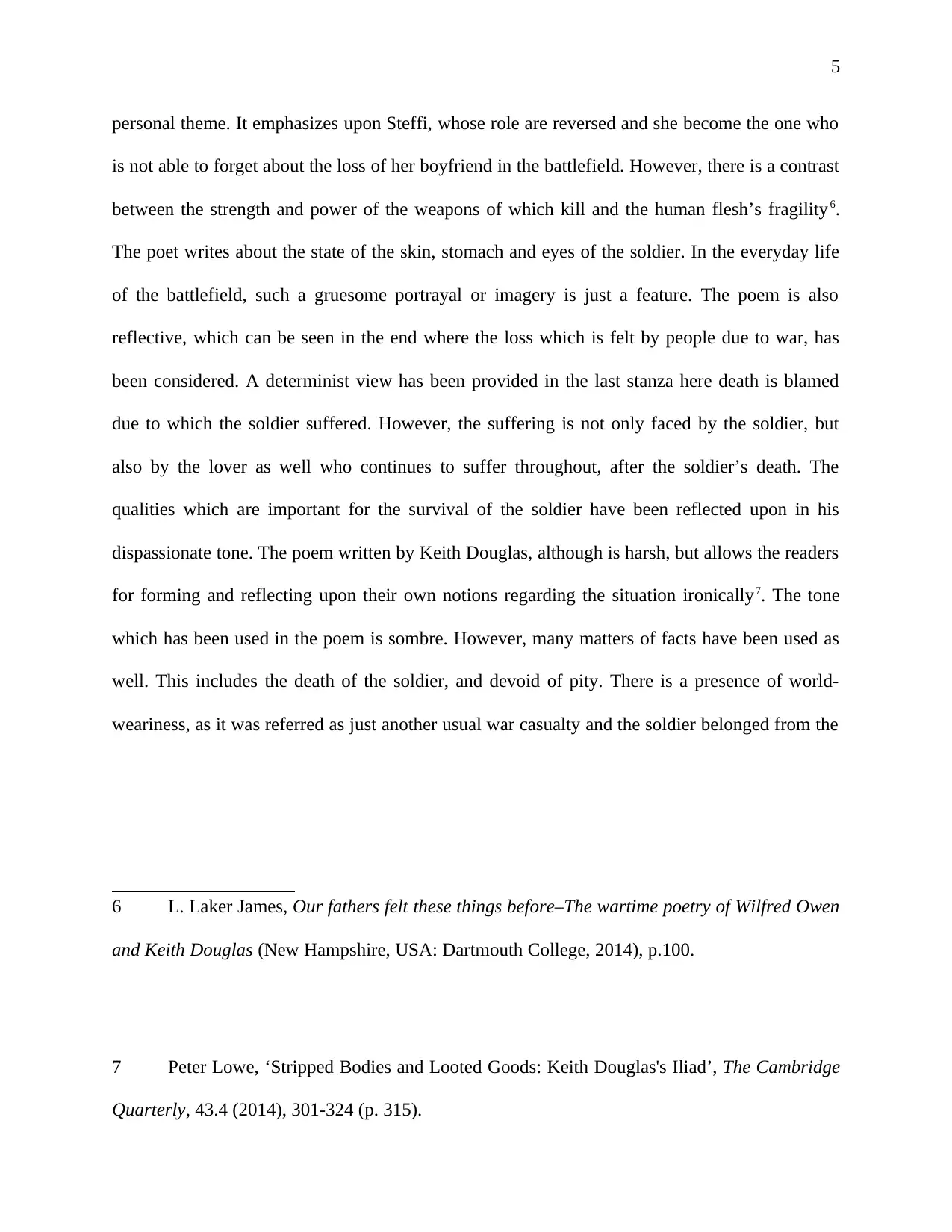
5
personal theme. It emphasizes upon Steffi, whose role are reversed and she become the one who
is not able to forget about the loss of her boyfriend in the battlefield. However, there is a contrast
between the strength and power of the weapons of which kill and the human flesh’s fragility6.
The poet writes about the state of the skin, stomach and eyes of the soldier. In the everyday life
of the battlefield, such a gruesome portrayal or imagery is just a feature. The poem is also
reflective, which can be seen in the end where the loss which is felt by people due to war, has
been considered. A determinist view has been provided in the last stanza here death is blamed
due to which the soldier suffered. However, the suffering is not only faced by the soldier, but
also by the lover as well who continues to suffer throughout, after the soldier’s death. The
qualities which are important for the survival of the soldier have been reflected upon in his
dispassionate tone. The poem written by Keith Douglas, although is harsh, but allows the readers
for forming and reflecting upon their own notions regarding the situation ironically7. The tone
which has been used in the poem is sombre. However, many matters of facts have been used as
well. This includes the death of the soldier, and devoid of pity. There is a presence of world-
weariness, as it was referred as just another usual war casualty and the soldier belonged from the
6 L. Laker James, Our fathers felt these things before–The wartime poetry of Wilfred Owen
and Keith Douglas (New Hampshire, USA: Dartmouth College, 2014), p.100.
7 Peter Lowe, ‘Stripped Bodies and Looted Goods: Keith Douglas's Iliad’, The Cambridge
Quarterly, 43.4 (2014), 301-324 (p. 315).
personal theme. It emphasizes upon Steffi, whose role are reversed and she become the one who
is not able to forget about the loss of her boyfriend in the battlefield. However, there is a contrast
between the strength and power of the weapons of which kill and the human flesh’s fragility6.
The poet writes about the state of the skin, stomach and eyes of the soldier. In the everyday life
of the battlefield, such a gruesome portrayal or imagery is just a feature. The poem is also
reflective, which can be seen in the end where the loss which is felt by people due to war, has
been considered. A determinist view has been provided in the last stanza here death is blamed
due to which the soldier suffered. However, the suffering is not only faced by the soldier, but
also by the lover as well who continues to suffer throughout, after the soldier’s death. The
qualities which are important for the survival of the soldier have been reflected upon in his
dispassionate tone. The poem written by Keith Douglas, although is harsh, but allows the readers
for forming and reflecting upon their own notions regarding the situation ironically7. The tone
which has been used in the poem is sombre. However, many matters of facts have been used as
well. This includes the death of the soldier, and devoid of pity. There is a presence of world-
weariness, as it was referred as just another usual war casualty and the soldier belonged from the
6 L. Laker James, Our fathers felt these things before–The wartime poetry of Wilfred Owen
and Keith Douglas (New Hampshire, USA: Dartmouth College, 2014), p.100.
7 Peter Lowe, ‘Stripped Bodies and Looted Goods: Keith Douglas's Iliad’, The Cambridge
Quarterly, 43.4 (2014), 301-324 (p. 315).
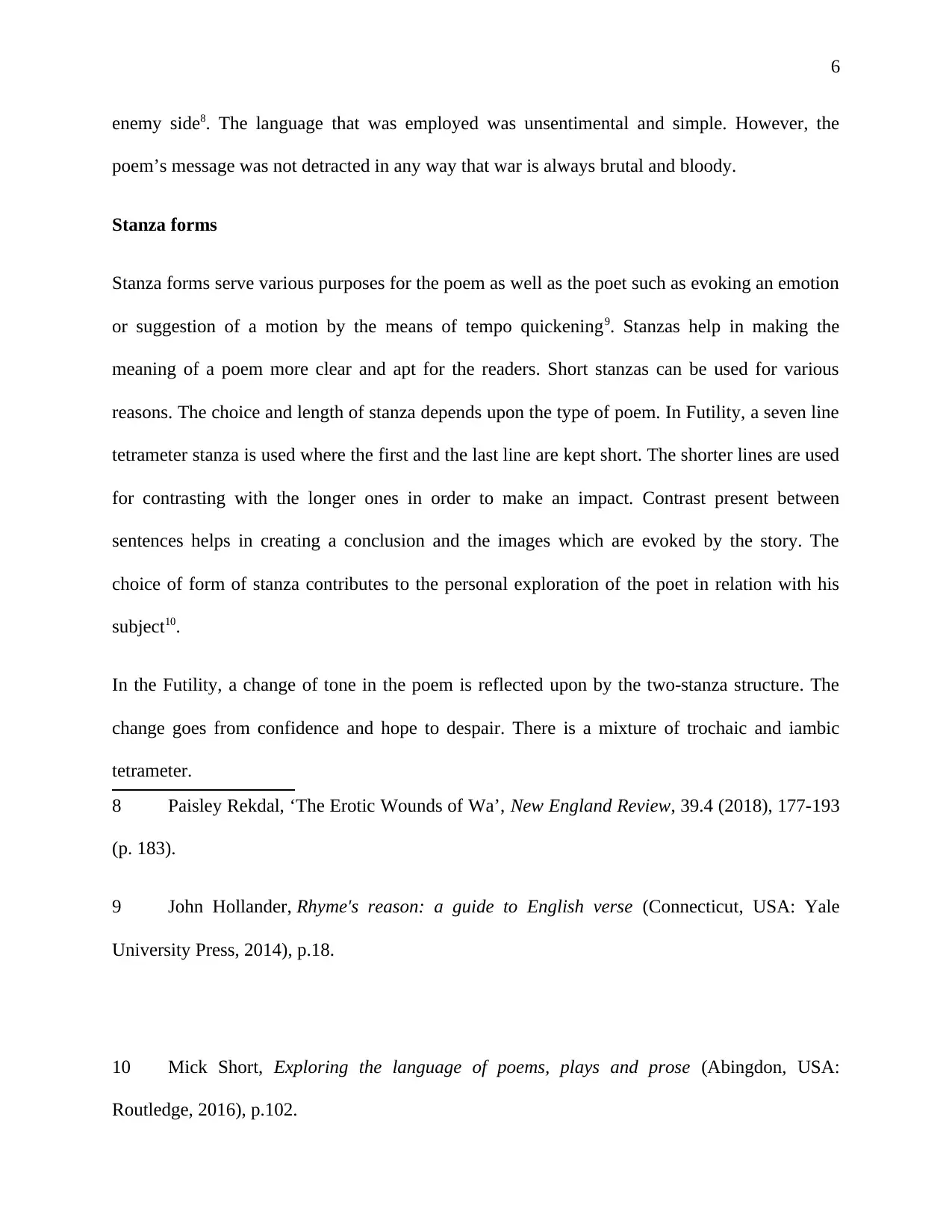
6
enemy side8. The language that was employed was unsentimental and simple. However, the
poem’s message was not detracted in any way that war is always brutal and bloody.
Stanza forms
Stanza forms serve various purposes for the poem as well as the poet such as evoking an emotion
or suggestion of a motion by the means of tempo quickening9. Stanzas help in making the
meaning of a poem more clear and apt for the readers. Short stanzas can be used for various
reasons. The choice and length of stanza depends upon the type of poem. In Futility, a seven line
tetrameter stanza is used where the first and the last line are kept short. The shorter lines are used
for contrasting with the longer ones in order to make an impact. Contrast present between
sentences helps in creating a conclusion and the images which are evoked by the story. The
choice of form of stanza contributes to the personal exploration of the poet in relation with his
subject10.
In the Futility, a change of tone in the poem is reflected upon by the two-stanza structure. The
change goes from confidence and hope to despair. There is a mixture of trochaic and iambic
tetrameter.
8 Paisley Rekdal, ‘The Erotic Wounds of Wa’, New England Review, 39.4 (2018), 177-193
(p. 183).
9 John Hollander, Rhyme's reason: a guide to English verse (Connecticut, USA: Yale
University Press, 2014), p.18.
10 Mick Short, Exploring the language of poems, plays and prose (Abingdon, USA:
Routledge, 2016), p.102.
enemy side8. The language that was employed was unsentimental and simple. However, the
poem’s message was not detracted in any way that war is always brutal and bloody.
Stanza forms
Stanza forms serve various purposes for the poem as well as the poet such as evoking an emotion
or suggestion of a motion by the means of tempo quickening9. Stanzas help in making the
meaning of a poem more clear and apt for the readers. Short stanzas can be used for various
reasons. The choice and length of stanza depends upon the type of poem. In Futility, a seven line
tetrameter stanza is used where the first and the last line are kept short. The shorter lines are used
for contrasting with the longer ones in order to make an impact. Contrast present between
sentences helps in creating a conclusion and the images which are evoked by the story. The
choice of form of stanza contributes to the personal exploration of the poet in relation with his
subject10.
In the Futility, a change of tone in the poem is reflected upon by the two-stanza structure. The
change goes from confidence and hope to despair. There is a mixture of trochaic and iambic
tetrameter.
8 Paisley Rekdal, ‘The Erotic Wounds of Wa’, New England Review, 39.4 (2018), 177-193
(p. 183).
9 John Hollander, Rhyme's reason: a guide to English verse (Connecticut, USA: Yale
University Press, 2014), p.18.
10 Mick Short, Exploring the language of poems, plays and prose (Abingdon, USA:
Routledge, 2016), p.102.
⊘ This is a preview!⊘
Do you want full access?
Subscribe today to unlock all pages.

Trusted by 1+ million students worldwide
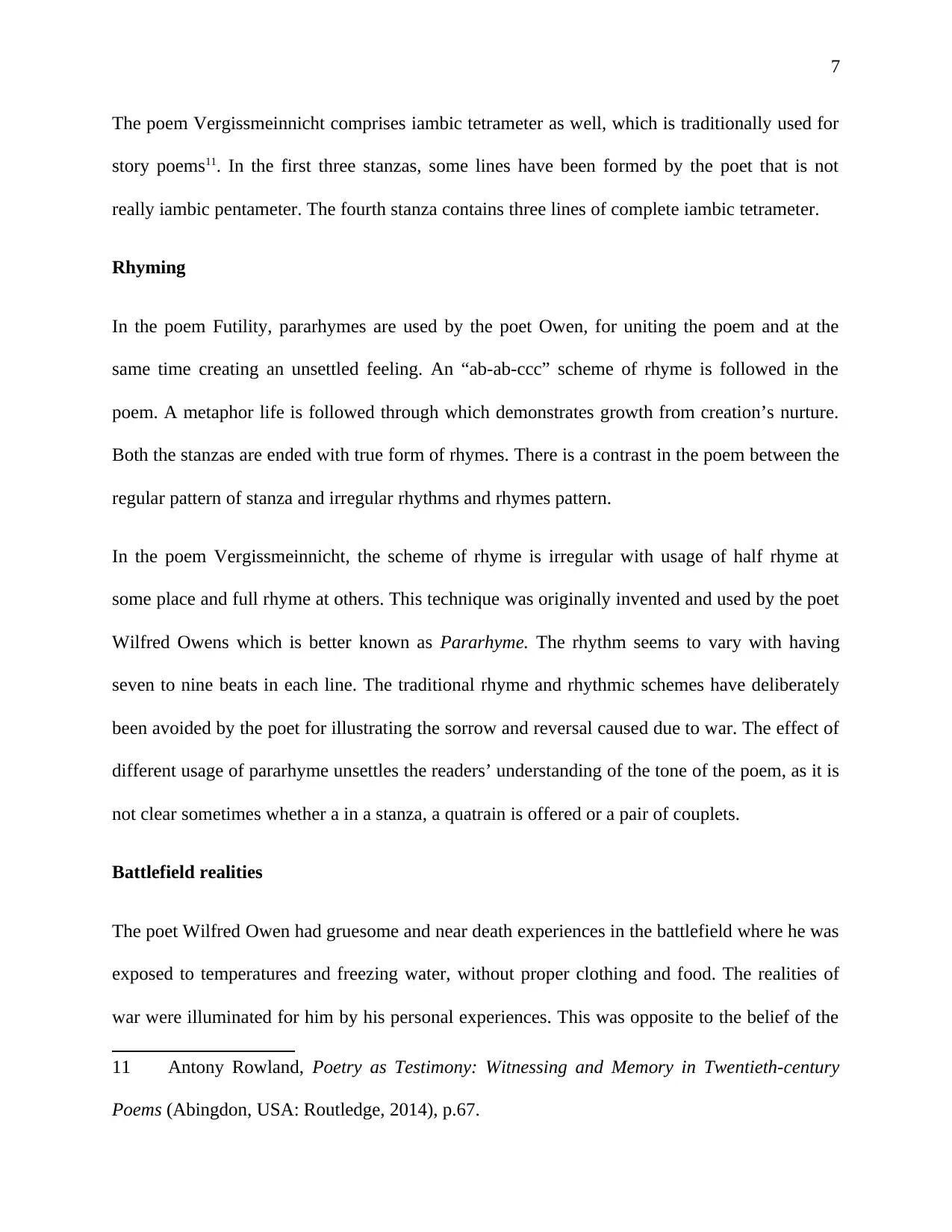
7
The poem Vergissmeinnicht comprises iambic tetrameter as well, which is traditionally used for
story poems11. In the first three stanzas, some lines have been formed by the poet that is not
really iambic pentameter. The fourth stanza contains three lines of complete iambic tetrameter.
Rhyming
In the poem Futility, pararhymes are used by the poet Owen, for uniting the poem and at the
same time creating an unsettled feeling. An “ab-ab-ccc” scheme of rhyme is followed in the
poem. A metaphor life is followed through which demonstrates growth from creation’s nurture.
Both the stanzas are ended with true form of rhymes. There is a contrast in the poem between the
regular pattern of stanza and irregular rhythms and rhymes pattern.
In the poem Vergissmeinnicht, the scheme of rhyme is irregular with usage of half rhyme at
some place and full rhyme at others. This technique was originally invented and used by the poet
Wilfred Owens which is better known as Pararhyme. The rhythm seems to vary with having
seven to nine beats in each line. The traditional rhyme and rhythmic schemes have deliberately
been avoided by the poet for illustrating the sorrow and reversal caused due to war. The effect of
different usage of pararhyme unsettles the readers’ understanding of the tone of the poem, as it is
not clear sometimes whether a in a stanza, a quatrain is offered or a pair of couplets.
Battlefield realities
The poet Wilfred Owen had gruesome and near death experiences in the battlefield where he was
exposed to temperatures and freezing water, without proper clothing and food. The realities of
war were illuminated for him by his personal experiences. This was opposite to the belief of the
11 Antony Rowland, Poetry as Testimony: Witnessing and Memory in Twentieth-century
Poems (Abingdon, USA: Routledge, 2014), p.67.
The poem Vergissmeinnicht comprises iambic tetrameter as well, which is traditionally used for
story poems11. In the first three stanzas, some lines have been formed by the poet that is not
really iambic pentameter. The fourth stanza contains three lines of complete iambic tetrameter.
Rhyming
In the poem Futility, pararhymes are used by the poet Owen, for uniting the poem and at the
same time creating an unsettled feeling. An “ab-ab-ccc” scheme of rhyme is followed in the
poem. A metaphor life is followed through which demonstrates growth from creation’s nurture.
Both the stanzas are ended with true form of rhymes. There is a contrast in the poem between the
regular pattern of stanza and irregular rhythms and rhymes pattern.
In the poem Vergissmeinnicht, the scheme of rhyme is irregular with usage of half rhyme at
some place and full rhyme at others. This technique was originally invented and used by the poet
Wilfred Owens which is better known as Pararhyme. The rhythm seems to vary with having
seven to nine beats in each line. The traditional rhyme and rhythmic schemes have deliberately
been avoided by the poet for illustrating the sorrow and reversal caused due to war. The effect of
different usage of pararhyme unsettles the readers’ understanding of the tone of the poem, as it is
not clear sometimes whether a in a stanza, a quatrain is offered or a pair of couplets.
Battlefield realities
The poet Wilfred Owen had gruesome and near death experiences in the battlefield where he was
exposed to temperatures and freezing water, without proper clothing and food. The realities of
war were illuminated for him by his personal experiences. This was opposite to the belief of the
11 Antony Rowland, Poetry as Testimony: Witnessing and Memory in Twentieth-century
Poems (Abingdon, USA: Routledge, 2014), p.67.
Paraphrase This Document
Need a fresh take? Get an instant paraphrase of this document with our AI Paraphraser
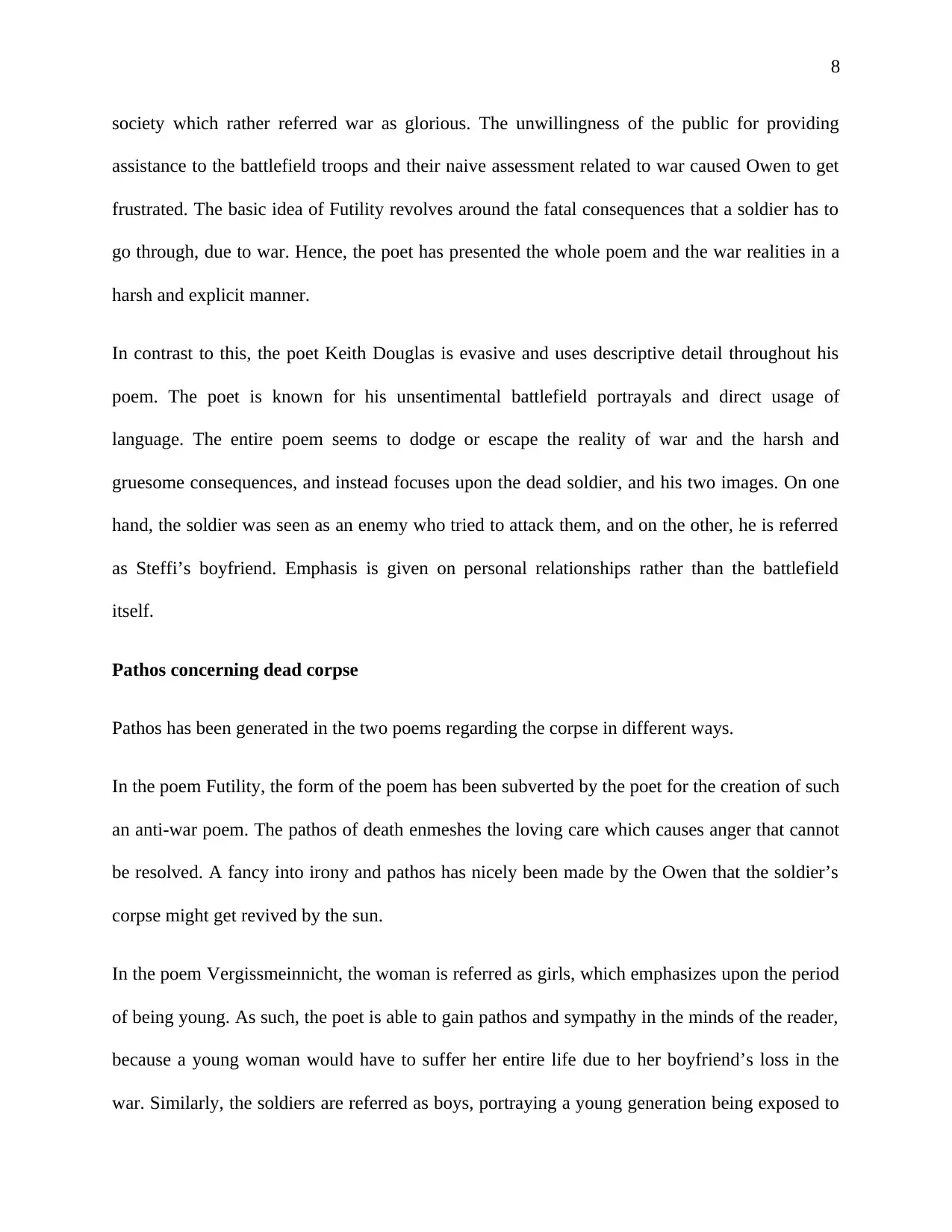
8
society which rather referred war as glorious. The unwillingness of the public for providing
assistance to the battlefield troops and their naive assessment related to war caused Owen to get
frustrated. The basic idea of Futility revolves around the fatal consequences that a soldier has to
go through, due to war. Hence, the poet has presented the whole poem and the war realities in a
harsh and explicit manner.
In contrast to this, the poet Keith Douglas is evasive and uses descriptive detail throughout his
poem. The poet is known for his unsentimental battlefield portrayals and direct usage of
language. The entire poem seems to dodge or escape the reality of war and the harsh and
gruesome consequences, and instead focuses upon the dead soldier, and his two images. On one
hand, the soldier was seen as an enemy who tried to attack them, and on the other, he is referred
as Steffi’s boyfriend. Emphasis is given on personal relationships rather than the battlefield
itself.
Pathos concerning dead corpse
Pathos has been generated in the two poems regarding the corpse in different ways.
In the poem Futility, the form of the poem has been subverted by the poet for the creation of such
an anti-war poem. The pathos of death enmeshes the loving care which causes anger that cannot
be resolved. A fancy into irony and pathos has nicely been made by the Owen that the soldier’s
corpse might get revived by the sun.
In the poem Vergissmeinnicht, the woman is referred as girls, which emphasizes upon the period
of being young. As such, the poet is able to gain pathos and sympathy in the minds of the reader,
because a young woman would have to suffer her entire life due to her boyfriend’s loss in the
war. Similarly, the soldiers are referred as boys, portraying a young generation being exposed to
society which rather referred war as glorious. The unwillingness of the public for providing
assistance to the battlefield troops and their naive assessment related to war caused Owen to get
frustrated. The basic idea of Futility revolves around the fatal consequences that a soldier has to
go through, due to war. Hence, the poet has presented the whole poem and the war realities in a
harsh and explicit manner.
In contrast to this, the poet Keith Douglas is evasive and uses descriptive detail throughout his
poem. The poet is known for his unsentimental battlefield portrayals and direct usage of
language. The entire poem seems to dodge or escape the reality of war and the harsh and
gruesome consequences, and instead focuses upon the dead soldier, and his two images. On one
hand, the soldier was seen as an enemy who tried to attack them, and on the other, he is referred
as Steffi’s boyfriend. Emphasis is given on personal relationships rather than the battlefield
itself.
Pathos concerning dead corpse
Pathos has been generated in the two poems regarding the corpse in different ways.
In the poem Futility, the form of the poem has been subverted by the poet for the creation of such
an anti-war poem. The pathos of death enmeshes the loving care which causes anger that cannot
be resolved. A fancy into irony and pathos has nicely been made by the Owen that the soldier’s
corpse might get revived by the sun.
In the poem Vergissmeinnicht, the woman is referred as girls, which emphasizes upon the period
of being young. As such, the poet is able to gain pathos and sympathy in the minds of the reader,
because a young woman would have to suffer her entire life due to her boyfriend’s loss in the
war. Similarly, the soldiers are referred as boys, portraying a young generation being exposed to
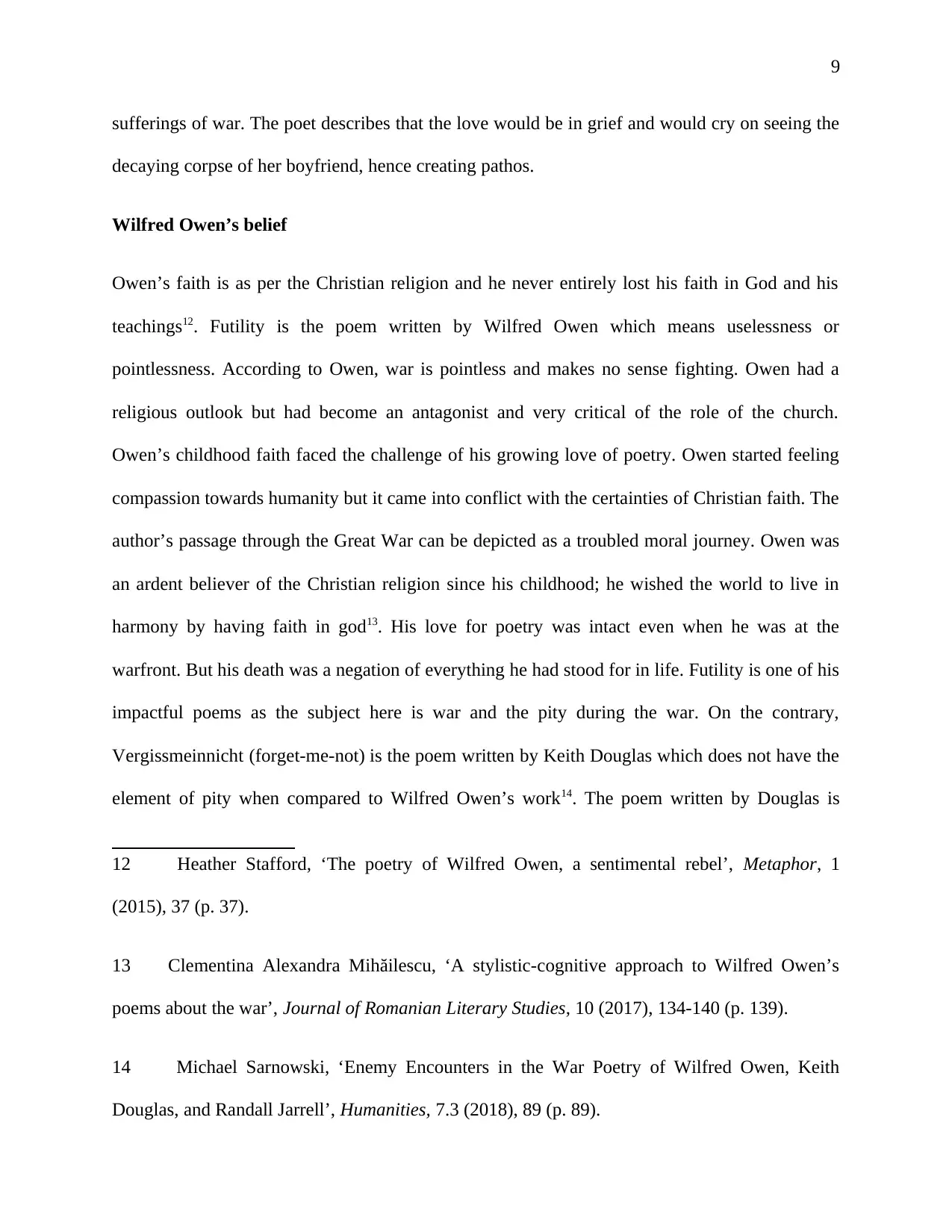
9
sufferings of war. The poet describes that the love would be in grief and would cry on seeing the
decaying corpse of her boyfriend, hence creating pathos.
Wilfred Owen’s belief
Owen’s faith is as per the Christian religion and he never entirely lost his faith in God and his
teachings12. Futility is the poem written by Wilfred Owen which means uselessness or
pointlessness. According to Owen, war is pointless and makes no sense fighting. Owen had a
religious outlook but had become an antagonist and very critical of the role of the church.
Owen’s childhood faith faced the challenge of his growing love of poetry. Owen started feeling
compassion towards humanity but it came into conflict with the certainties of Christian faith. The
author’s passage through the Great War can be depicted as a troubled moral journey. Owen was
an ardent believer of the Christian religion since his childhood; he wished the world to live in
harmony by having faith in god13. His love for poetry was intact even when he was at the
warfront. But his death was a negation of everything he had stood for in life. Futility is one of his
impactful poems as the subject here is war and the pity during the war. On the contrary,
Vergissmeinnicht (forget-me-not) is the poem written by Keith Douglas which does not have the
element of pity when compared to Wilfred Owen’s work14. The poem written by Douglas is
12 Heather Stafford, ‘The poetry of Wilfred Owen, a sentimental rebel’, Metaphor, 1
(2015), 37 (p. 37).
13 Clementina Alexandra Mihăilescu, ‘A stylistic-cognitive approach to Wilfred Owen’s
poems about the war’, Journal of Romanian Literary Studies, 10 (2017), 134-140 (p. 139).
14 Michael Sarnowski, ‘Enemy Encounters in the War Poetry of Wilfred Owen, Keith
Douglas, and Randall Jarrell’, Humanities, 7.3 (2018), 89 (p. 89).
sufferings of war. The poet describes that the love would be in grief and would cry on seeing the
decaying corpse of her boyfriend, hence creating pathos.
Wilfred Owen’s belief
Owen’s faith is as per the Christian religion and he never entirely lost his faith in God and his
teachings12. Futility is the poem written by Wilfred Owen which means uselessness or
pointlessness. According to Owen, war is pointless and makes no sense fighting. Owen had a
religious outlook but had become an antagonist and very critical of the role of the church.
Owen’s childhood faith faced the challenge of his growing love of poetry. Owen started feeling
compassion towards humanity but it came into conflict with the certainties of Christian faith. The
author’s passage through the Great War can be depicted as a troubled moral journey. Owen was
an ardent believer of the Christian religion since his childhood; he wished the world to live in
harmony by having faith in god13. His love for poetry was intact even when he was at the
warfront. But his death was a negation of everything he had stood for in life. Futility is one of his
impactful poems as the subject here is war and the pity during the war. On the contrary,
Vergissmeinnicht (forget-me-not) is the poem written by Keith Douglas which does not have the
element of pity when compared to Wilfred Owen’s work14. The poem written by Douglas is
12 Heather Stafford, ‘The poetry of Wilfred Owen, a sentimental rebel’, Metaphor, 1
(2015), 37 (p. 37).
13 Clementina Alexandra Mihăilescu, ‘A stylistic-cognitive approach to Wilfred Owen’s
poems about the war’, Journal of Romanian Literary Studies, 10 (2017), 134-140 (p. 139).
14 Michael Sarnowski, ‘Enemy Encounters in the War Poetry of Wilfred Owen, Keith
Douglas, and Randall Jarrell’, Humanities, 7.3 (2018), 89 (p. 89).
⊘ This is a preview!⊘
Do you want full access?
Subscribe today to unlock all pages.

Trusted by 1+ million students worldwide
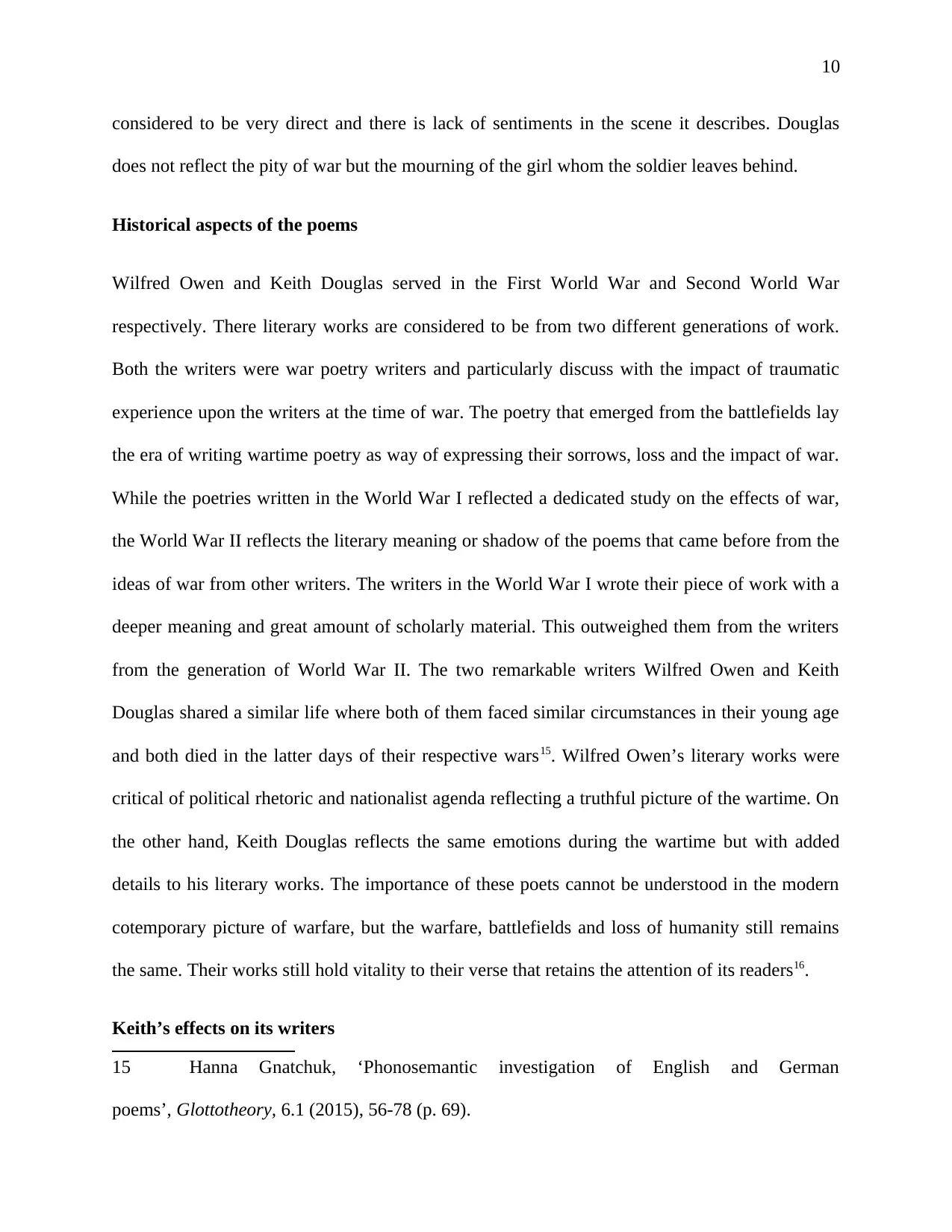
10
considered to be very direct and there is lack of sentiments in the scene it describes. Douglas
does not reflect the pity of war but the mourning of the girl whom the soldier leaves behind.
Historical aspects of the poems
Wilfred Owen and Keith Douglas served in the First World War and Second World War
respectively. There literary works are considered to be from two different generations of work.
Both the writers were war poetry writers and particularly discuss with the impact of traumatic
experience upon the writers at the time of war. The poetry that emerged from the battlefields lay
the era of writing wartime poetry as way of expressing their sorrows, loss and the impact of war.
While the poetries written in the World War I reflected a dedicated study on the effects of war,
the World War II reflects the literary meaning or shadow of the poems that came before from the
ideas of war from other writers. The writers in the World War I wrote their piece of work with a
deeper meaning and great amount of scholarly material. This outweighed them from the writers
from the generation of World War II. The two remarkable writers Wilfred Owen and Keith
Douglas shared a similar life where both of them faced similar circumstances in their young age
and both died in the latter days of their respective wars15. Wilfred Owen’s literary works were
critical of political rhetoric and nationalist agenda reflecting a truthful picture of the wartime. On
the other hand, Keith Douglas reflects the same emotions during the wartime but with added
details to his literary works. The importance of these poets cannot be understood in the modern
cotemporary picture of warfare, but the warfare, battlefields and loss of humanity still remains
the same. Their works still hold vitality to their verse that retains the attention of its readers16.
Keith’s effects on its writers
15 Hanna Gnatchuk, ‘Phonosemantic investigation of English and German
poems’, Glottotheory, 6.1 (2015), 56-78 (p. 69).
considered to be very direct and there is lack of sentiments in the scene it describes. Douglas
does not reflect the pity of war but the mourning of the girl whom the soldier leaves behind.
Historical aspects of the poems
Wilfred Owen and Keith Douglas served in the First World War and Second World War
respectively. There literary works are considered to be from two different generations of work.
Both the writers were war poetry writers and particularly discuss with the impact of traumatic
experience upon the writers at the time of war. The poetry that emerged from the battlefields lay
the era of writing wartime poetry as way of expressing their sorrows, loss and the impact of war.
While the poetries written in the World War I reflected a dedicated study on the effects of war,
the World War II reflects the literary meaning or shadow of the poems that came before from the
ideas of war from other writers. The writers in the World War I wrote their piece of work with a
deeper meaning and great amount of scholarly material. This outweighed them from the writers
from the generation of World War II. The two remarkable writers Wilfred Owen and Keith
Douglas shared a similar life where both of them faced similar circumstances in their young age
and both died in the latter days of their respective wars15. Wilfred Owen’s literary works were
critical of political rhetoric and nationalist agenda reflecting a truthful picture of the wartime. On
the other hand, Keith Douglas reflects the same emotions during the wartime but with added
details to his literary works. The importance of these poets cannot be understood in the modern
cotemporary picture of warfare, but the warfare, battlefields and loss of humanity still remains
the same. Their works still hold vitality to their verse that retains the attention of its readers16.
Keith’s effects on its writers
15 Hanna Gnatchuk, ‘Phonosemantic investigation of English and German
poems’, Glottotheory, 6.1 (2015), 56-78 (p. 69).
Paraphrase This Document
Need a fresh take? Get an instant paraphrase of this document with our AI Paraphraser
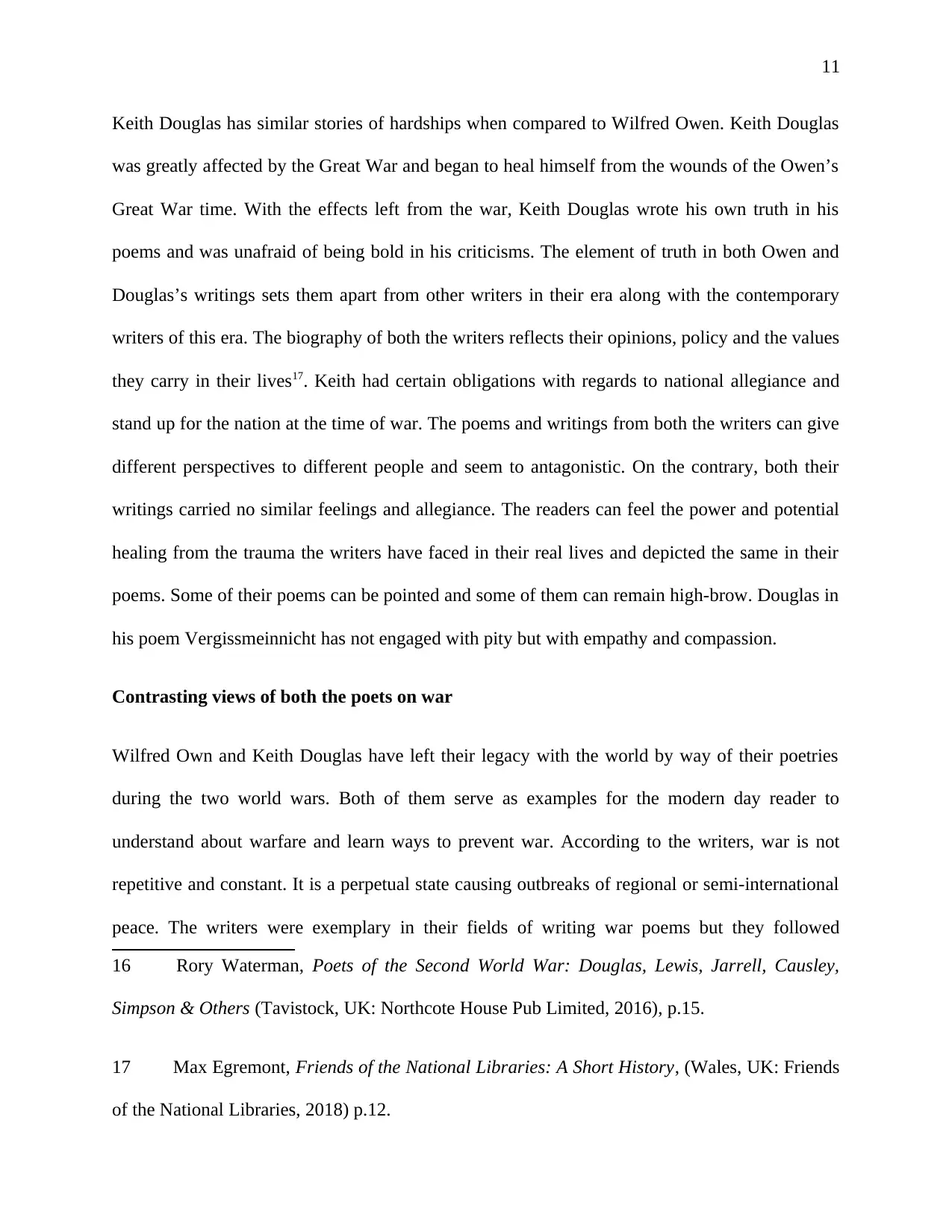
11
Keith Douglas has similar stories of hardships when compared to Wilfred Owen. Keith Douglas
was greatly affected by the Great War and began to heal himself from the wounds of the Owen’s
Great War time. With the effects left from the war, Keith Douglas wrote his own truth in his
poems and was unafraid of being bold in his criticisms. The element of truth in both Owen and
Douglas’s writings sets them apart from other writers in their era along with the contemporary
writers of this era. The biography of both the writers reflects their opinions, policy and the values
they carry in their lives17. Keith had certain obligations with regards to national allegiance and
stand up for the nation at the time of war. The poems and writings from both the writers can give
different perspectives to different people and seem to antagonistic. On the contrary, both their
writings carried no similar feelings and allegiance. The readers can feel the power and potential
healing from the trauma the writers have faced in their real lives and depicted the same in their
poems. Some of their poems can be pointed and some of them can remain high-brow. Douglas in
his poem Vergissmeinnicht has not engaged with pity but with empathy and compassion.
Contrasting views of both the poets on war
Wilfred Own and Keith Douglas have left their legacy with the world by way of their poetries
during the two world wars. Both of them serve as examples for the modern day reader to
understand about warfare and learn ways to prevent war. According to the writers, war is not
repetitive and constant. It is a perpetual state causing outbreaks of regional or semi-international
peace. The writers were exemplary in their fields of writing war poems but they followed
16 Rory Waterman, Poets of the Second World War: Douglas, Lewis, Jarrell, Causley,
Simpson & Others (Tavistock, UK: Northcote House Pub Limited, 2016), p.15.
17 Max Egremont, Friends of the National Libraries: A Short History, (Wales, UK: Friends
of the National Libraries, 2018) p.12.
Keith Douglas has similar stories of hardships when compared to Wilfred Owen. Keith Douglas
was greatly affected by the Great War and began to heal himself from the wounds of the Owen’s
Great War time. With the effects left from the war, Keith Douglas wrote his own truth in his
poems and was unafraid of being bold in his criticisms. The element of truth in both Owen and
Douglas’s writings sets them apart from other writers in their era along with the contemporary
writers of this era. The biography of both the writers reflects their opinions, policy and the values
they carry in their lives17. Keith had certain obligations with regards to national allegiance and
stand up for the nation at the time of war. The poems and writings from both the writers can give
different perspectives to different people and seem to antagonistic. On the contrary, both their
writings carried no similar feelings and allegiance. The readers can feel the power and potential
healing from the trauma the writers have faced in their real lives and depicted the same in their
poems. Some of their poems can be pointed and some of them can remain high-brow. Douglas in
his poem Vergissmeinnicht has not engaged with pity but with empathy and compassion.
Contrasting views of both the poets on war
Wilfred Own and Keith Douglas have left their legacy with the world by way of their poetries
during the two world wars. Both of them serve as examples for the modern day reader to
understand about warfare and learn ways to prevent war. According to the writers, war is not
repetitive and constant. It is a perpetual state causing outbreaks of regional or semi-international
peace. The writers were exemplary in their fields of writing war poems but they followed
16 Rory Waterman, Poets of the Second World War: Douglas, Lewis, Jarrell, Causley,
Simpson & Others (Tavistock, UK: Northcote House Pub Limited, 2016), p.15.
17 Max Egremont, Friends of the National Libraries: A Short History, (Wales, UK: Friends
of the National Libraries, 2018) p.12.
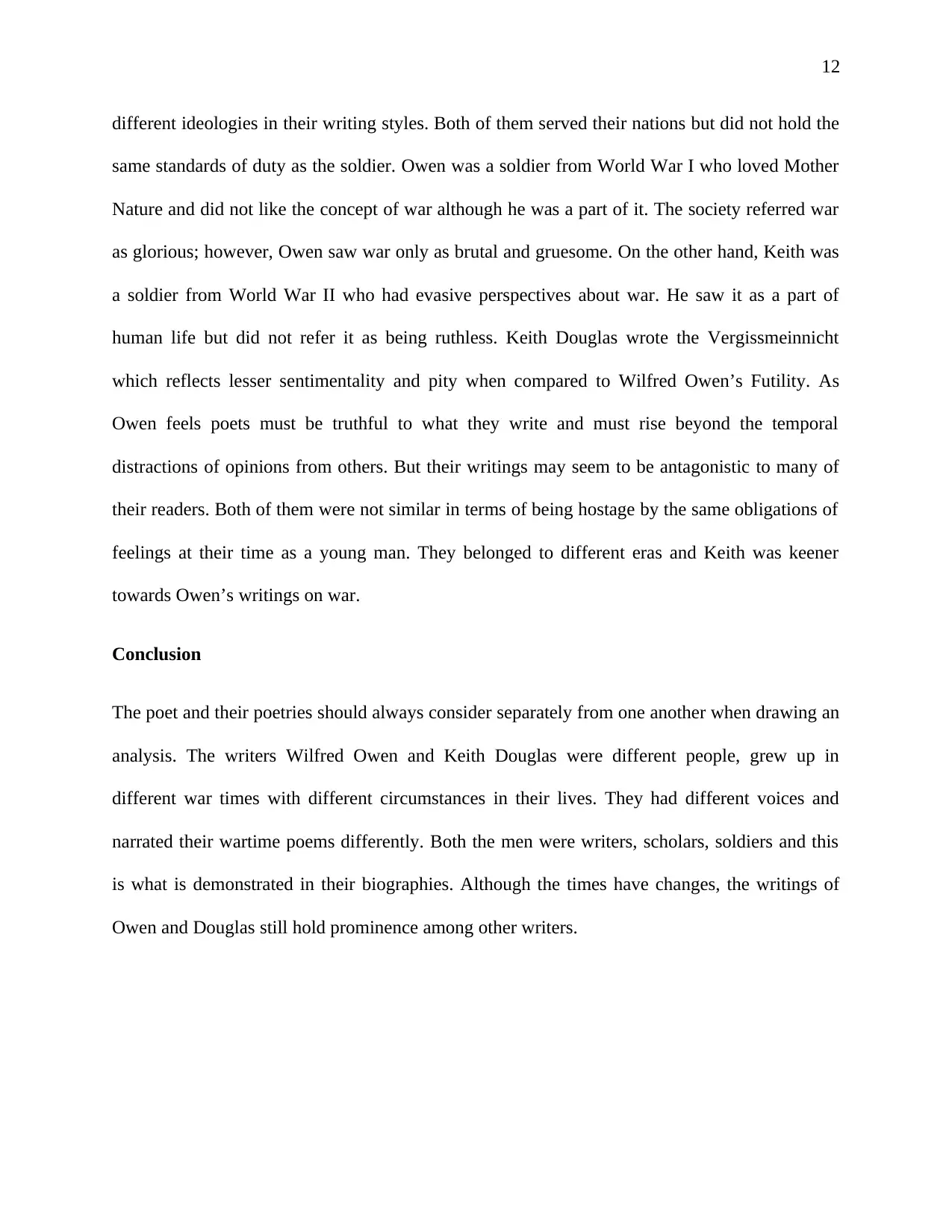
12
different ideologies in their writing styles. Both of them served their nations but did not hold the
same standards of duty as the soldier. Owen was a soldier from World War I who loved Mother
Nature and did not like the concept of war although he was a part of it. The society referred war
as glorious; however, Owen saw war only as brutal and gruesome. On the other hand, Keith was
a soldier from World War II who had evasive perspectives about war. He saw it as a part of
human life but did not refer it as being ruthless. Keith Douglas wrote the Vergissmeinnicht
which reflects lesser sentimentality and pity when compared to Wilfred Owen’s Futility. As
Owen feels poets must be truthful to what they write and must rise beyond the temporal
distractions of opinions from others. But their writings may seem to be antagonistic to many of
their readers. Both of them were not similar in terms of being hostage by the same obligations of
feelings at their time as a young man. They belonged to different eras and Keith was keener
towards Owen’s writings on war.
Conclusion
The poet and their poetries should always consider separately from one another when drawing an
analysis. The writers Wilfred Owen and Keith Douglas were different people, grew up in
different war times with different circumstances in their lives. They had different voices and
narrated their wartime poems differently. Both the men were writers, scholars, soldiers and this
is what is demonstrated in their biographies. Although the times have changes, the writings of
Owen and Douglas still hold prominence among other writers.
different ideologies in their writing styles. Both of them served their nations but did not hold the
same standards of duty as the soldier. Owen was a soldier from World War I who loved Mother
Nature and did not like the concept of war although he was a part of it. The society referred war
as glorious; however, Owen saw war only as brutal and gruesome. On the other hand, Keith was
a soldier from World War II who had evasive perspectives about war. He saw it as a part of
human life but did not refer it as being ruthless. Keith Douglas wrote the Vergissmeinnicht
which reflects lesser sentimentality and pity when compared to Wilfred Owen’s Futility. As
Owen feels poets must be truthful to what they write and must rise beyond the temporal
distractions of opinions from others. But their writings may seem to be antagonistic to many of
their readers. Both of them were not similar in terms of being hostage by the same obligations of
feelings at their time as a young man. They belonged to different eras and Keith was keener
towards Owen’s writings on war.
Conclusion
The poet and their poetries should always consider separately from one another when drawing an
analysis. The writers Wilfred Owen and Keith Douglas were different people, grew up in
different war times with different circumstances in their lives. They had different voices and
narrated their wartime poems differently. Both the men were writers, scholars, soldiers and this
is what is demonstrated in their biographies. Although the times have changes, the writings of
Owen and Douglas still hold prominence among other writers.
⊘ This is a preview!⊘
Do you want full access?
Subscribe today to unlock all pages.

Trusted by 1+ million students worldwide
1 out of 14
Your All-in-One AI-Powered Toolkit for Academic Success.
+13062052269
info@desklib.com
Available 24*7 on WhatsApp / Email
![[object Object]](/_next/static/media/star-bottom.7253800d.svg)
Unlock your academic potential
Copyright © 2020–2025 A2Z Services. All Rights Reserved. Developed and managed by ZUCOL.